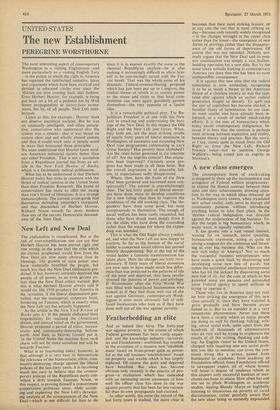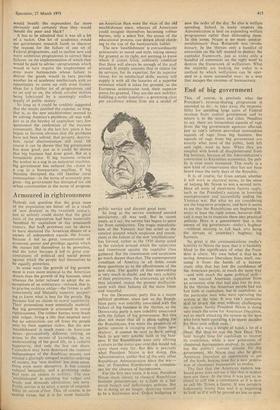A new class emerges
The contemporary form of muck-raking is designed to show up the incompetence and arrogance of Federal welfare programmes: to expose the dismal contrast between their aims and their achievements, drawing atten- tion to the way in which ideas dreamed up in Washington ivory towers, when translated Into urban reality, only serve to disrupt old community patterns without introducing anything better to take their place. In the 'thirties radical indignation was directed against the malpractices of big business. To- day the target is big bureaucracy which, in many ways, is equally vulnerable.
It has grown into a vast vested interest, waxing fat on research, social spending, bureaucratic expansion, acting as quite as strong a magnet for the ambitious and thrust- ing as ever big business did. Who are the new rich today in America? Not so much the successful business entrepreneurs who have made a quick buck by discovering and developing some new line of goods, but rather the successful intellectual entrepreneur who has hit the jackpot by discovering some new line of ills, for the cure of which he has patented some pet panacea and persuaded some Federal agency to spend millions in trying to operate it.
Those who live in America may not real- ise how striking the emergence of this new class actually is, since they have watched it grow gradually and have become accus- tomed to it. But to an outsider it is a very remarkable phenomenon. Never can there have been a society where so many people are doing so well by thinking, talking, writ- ing, about social evils, quite apart from the hundreds of thousands of administrators who do very well by trying to implement the results of all this writing, thinking and talk- ing. An English visitor to the United States, charged with inquiring into any social prob- lem you like to mention, can cross the con- tinent living like a prince, passed from bureaucrat to academic, from academic to Foundation official, from Foundation official to newspaper expert, all of whose homes will boast a degree of opulence which in this country only successful bankers or mer- chants can hope to attain. How often has one not sat in plush Washington or academic studies, sipping Bloody Marys or highballs, listening to discussions on poverty or racial discrimination, rather painfully aware that the new ideas being so earnestly expounded would benefit the expounders far more obviously and certainly than they would benefit the poor and black?
It has to be admitted that it was all a bit of a racket. One lot of academics would use government research funds to discover the reasons for the failure of one set of Federal programmes, and to outline new and more ambitious programmes to correct these failures, on the implementation of which they would be paid to advise—programmes which would in turn require the employment of even more bureaucrats whose failure to deliver the goods would in turn provide another lot of academic intellectuals with an Opportunity to come up with even fresher ideas for a further lot of programmes and so on and so on, the whole circular motion being lubricated by a seemingly endless Supply of public money.
So long as it could be credibly suggested that the results justified the expense, so long, that is, as the new establishment seemed to be solving America's problems, all was well, just as in the heyday of capitalism very few questioned the credentials of the business community. But in the last few years it has begun to become obvious that the problems have not been solved; that poverty, depriva- tion, racial discrimination still exist. Of course it can be shown that big government has done good, just as it could be shown that big business had done good. But at a formidable price. If big business reduced the worker to a cog in an industrial machine, big government has reduced the itiLen to a cog in a bureaucratic machine. If big business disrupted the old familiar rural communities—in the name of economic pro- gress—big government has disrupted the old urban communities in the name of progress.











































 Previous page
Previous page